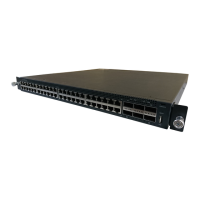User’s Guide FUJITSU PSWITCH
December/2018 135
3.1.9.15.4. Optimization to Support ECMP Hops in Large-Scale
Networks
The data center platform needs to support an increase in the number of ECMP next
hops in the route that has a major impact on scaling with respect to memory and
CPU processing. In order to deal with this, the OSPFv2 implementation of this
product optimizes memory usage and processing time in a large scale network and
enables a large number of next hops.
To support a large number of next hops, OSPF implementation is optimized as
follows.
The next hop information is stored in the OSPF route in an optimized form so
that the memory usage from the routing heap is not affected by the number of
ECMP next hops supported per route.
Transmit pacing is implemented for flooded LSAs, and the LSAs are flooded to
the OSPFv2 neighbor in an optimal way. Before the transmit pacing timer is
activated, the software keeps track of the neighbors that received the same LSA
instance and suppresses flooding to all those neighbors.
3.1.9.15.5. OSPF version 3 (IPv6)
OSPFv3 is an Open Shortest Path First (OSPF) routing protocol for IPv6. This is
similar to OSPFv2 in terms of link state database, intra/inter area and AS external
routes, and virtual links. Also, it differs from the corresponding part of IPv4 in
several respects. Peering was done using the link local address, the protocol was
not a network-centric but a link, the addressing semantics were migrated to the
leaf LSA and finally available for both IPv4 and IPv6.
OSPFv3 supports ECMP routes. OSPFv3 includes support for NSSA and AS external
LSA overflow limit. OSPFv3 is incompatible with RFC 1583. OSPFv3 authentication
utilizes the IPv6 stack IPSEC mechanism. Since IPSEC is not provided in the first IPv6
release, OSPFv3 does not support authentication mechanisms. Also, OSPFv3 does
not support MOSPF.
LSA formats have been changed, and the type 3 and type 4 summary LSAs have
been renamed to inter-area prefix LSA and inter-area router LSA respectively. Also
note that the OSPFv3 LSA identifier does not include addressing semantics. LSA
scope is generalized to links, areas, and AS scopes. In OSPFv3, unsupported LSAs
are kept in the database and flooded according to scope. In OSPFv3, routers with
more than 100 interfaces generate multiple router LSAs. A new link LSA has been

